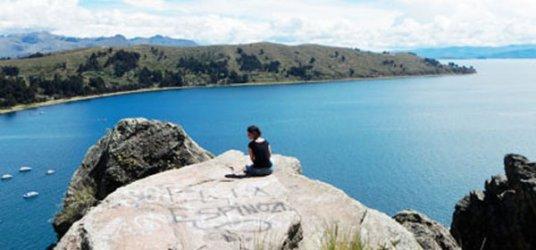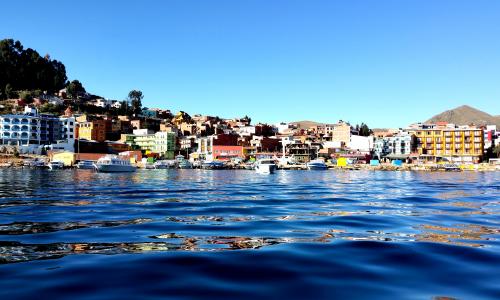
Since its launch in 2005, the Students for Development (SFD) program has been supporting senior-level Canadian university students’ participation in internships for a minimum of three months in developing countries and in emerging economies.
On behalf of International Co-op, Kiran Dhanoa got the chance to speak to Jeannette Friesen regarding her SFD experience. Jeannette’s SFD experience took her to Bolivia where she worked with the Solidarity and Free Trade Movement.
Q: If you could describe your international experience in one word, what would it be?
Humanizing.
Q: How did you find out about your international position?
I heard about the Students for Development (SFD) program by talking with a few of my peers who were in the process of applying. The program was also highly recommended to me by some of my closest professors
Q: What made you decide to do the Students for Development Program?

While pursuing an honours degree in International Studies and a minor in Sociology, culture has become my greatest passion and it continues to propel both my personal and professional ambitions. Since I started university three years ago I have travelled to over a dozen countries, fostering a deep appreciation for human and environmental affairs, a love for learning languages and just an overall curiosity for new experiences. I also recently completed an eight-month co-op term with Aboriginal Affairs, the department within the federal government that is responsible for meeting Canada's obligations to First Nations.
Bolivia, which has an indigenous population as high as 62% seemed like an appropriate way to deepen my understanding of international indigenous issues. Last year I had also taken an astonishing course called Global Problems and the Culture of Capitalism with John Bogardus, which inspired me to radically reflect on and alter nearly all expressions of my life. The course also informed me about the effectiveness of the solidarity economy in Latin America and the Students for Development program in Bolivia offered an essential experience to pair what I had learned in class with tangible experience in Bolivia.
Q: Which partner organization did you work with? What country and why?
I completed a three-month term with a non-profit umbrella organization called The Solidarity and Free Trade Movement (MESyCJ) in La Paz, Bolivia. The Movement has formulated a national network of more than 5,000 Bolivian organizations dedicated to the promotion of sustainable economic development and fair trade. MESyCJ has worked closely with the government to adopt sustainable economic development and fair trade as a national economic development strategy, and to create a national fair trade accreditation process. I worked primarily with the Training and Development Center for Women and Families (CECADEM) which encourages the participation of women in social, economic, political and cultural processes under the principles of gender equality and human rights. The organization provides training and employment to women who endure domestic abuse, empowering them to transcend their poverty, exclusion and even their dependency on their husbands. As a child who suffered the ramifications of domestic abuse I understood that educating women would lead to the education and empowerment of their children.
Q: What did you do as an intern?
Admittedly, my placement was quite informal as I did not have a specific title nor specific duties. My tasks varied depending on the needs of each organization; they included formulating and revising vision and mission statements, building websites, consulting micro-enterprises regarding their future development, helping to launch a new store, product photography, and translating documents.
Q: How did you prepare yourself to live and work abroad?
The Students for Development Handbook was a great resource as it described everything that I needed to consider to prepare and also directed me towards further resources. Frankly there are far too many things to list here, but for me the two most important things that I did to prepare was practice my Spanish and inform myself of safety concerns pertinent to Bolivia.
Q: How did you find it working in a different country? Was it your first time living abroad?
I have travelled extensively over the past few years including six months in Mexico, five months in South East Asia, and three months in Denmark, Slovakia and the Czech Republic. Although my previous travel experience helped to prepare, the nature of this placement was drastically different. It was my first time working in a foreign country where I was stationed in one city rather than backpacking all corners of the country. The work itself was incredibly rewarding but it did involve an initial adjustment on my part as I addressed not only language barriers but also cultural differences.
Q: Did you face any challenges throughout the work term? How did you deal with it?
The biggest barrier for me to overcome was Spanish. I was initially told that there would be people within the movement that spoke English. I was a little overwhelmed to learn that less than a handful of people I would meet in the entire three months would speak English, none of them within the organizations I worked for. Once I realized I needed to improve my comprehension I applied myself to learning Spanish for a few hours each day and worked with textbooks, audio lessons, and a private tutor. I saw Spanish flicks, practiced in cafe's, refused to talk with other tourists in English, and honestly just did the best I could. I am ecstatic that my Spanish has improved exponentially. There have been entire conversations where I understood every word spoken and it was not necessary for me to ask "Mande?" (“Pardon?”) half a dozen times to have them repeat themselves.
Q: Did you receive any financial support?
The Students for Development program is funded through the Canadian International Development Agency (CIDA), therefore all interns are eligible to receive reimbursement for up to $6,500 to help cover the costs incurred during their three month placement, including flight, accommodations, and daily living expenses. If the intern applies to the SFU International Co-op program, it is possible to request that this internship be considered an official co-op work placement, then apply for an SFU International Co-op Award which are valued up to $1,000; and also the SFU International Co-op Bursary. Although I was informed too late, it is also possible to apply to the C.A.R.E SFU Global Travel Award which will donate air miles to cover the cost of ones flight.
Q: How did you gain or improve your intercultural skills?
Since the program is funded through CIDA, all SFD interns have the opportunity to enroll in CIDA´s Pre-Departure Course for International Youth Interns which explores in depth how to become inter-culturally effective, covering concepts such as the difference in time, relationships, language and values. Even though I have travelled extensively in the past, this course was highly beneficial and I strongly recommend it. I also suggest that participants spend considerable time informing themselves about the culture and language of their destination, as I firmly believe these are essential components in establishing genuine connections. There are several adequate tools available to help learn a language, such as Pimsleur or Duolingo.
Q: Did you get time to do other activities, e.g. daytrips?
Yes! I went to Carnaval in Oruro, one of the UNESCO's Masterpieces of the Oral and Intangible Heritage of Humanity. Carnaval is an indigenous festival where thousands of people parade through the streets in their traditional clothing while demonstrating the traditional dances from their region. Beautiful. I also went to three of six UNESCO heritage sites in Bolivia, including Tiwanaku, El Fuerte de Samaipata and the Jesuit Missions in Conception. I climbed a dormant volcano, cycled the worlds most dangerous road, hiked to see a dozen beautiful cascades in Coroico, and visited the sites of Che Guevara's final days. I saw where his final battle took place, the schoolhouse he was executed in and his original burial site. I spent an entire day horseback riding the foothills of the Andes and spent the night camping with a dozen other people from all over the world. I even spent the day volunteering for an Animal Refuge, where I carried around a spider monkey for the day, took a baby deer for a walk, and shared my lunch with a funny little pig with quills.
Q: What was the best thing about the country you worked in?
Bolivia is remarkably rich in its biodiversity and its culture. During my visit to Samaipata I hiked 10km to a mountain top that is home to the ancient archaeological site of El Fuerte de Samaipata and features buildings from the Chanes, Incas and Spaniards. There was a visual transitional point where I could see all four biomes of Bolivia including the Amazon rainforest, the ChiquitanÃa tropical savanna, the Pantanal wetlands and the grasslands of the Andes. Bolivia contains about 45% of the world’s biodiversity and the government has designated 19.4% of Bolivia as protected conservation sites (Canada only conserves 9.9%). Bolivia's geographical diversity is reflected in its cultural diversity where more than thirty different cultural groups converge. An astounding 62% of Bolivia's population is indigenous, most remaining true to their traditional language, dress and culture. Meanwhile, Canada's aboriginal population has fallen to as low as 3.8% and to this day is threatened by assimilation and homogenization. Bolivia may be economically poor, but they have cultural richness that is almost incomprehensible to a Canadian.
Q: What was one of your most memorable moments?

The day before my departure a handful of women whom I had been working asked me to have lunch with them. What was intended to be only lunch became a full-day event as the women prepared several traditional Bolivian dishes for me. A woman had brought with her a traditional Inca garb for me to wear and so I spent a good portion of the day strutting around with her two-year-old son as an Inca-in-training. The women and I talked the entire day away, discussing food, family, politics and even economics. After all was said and dessert was done, the women gathered together to present me with a handmade gift, a beautiful letter of reference, and a certificate that they had made to thank the University. When it was dark and time for me to go home, I walked around to give my hugs and goodbyes. The gratitude that I felt from these women was incredibly moving and demonstrated for me that what I had done had a very real impact on those around me. I can make a difference.
Q: Were you able to make valuable connections/networks while abroad?
One of the beautiful things about Bolivian women is their ability to jumble one's definition of valuable. In Bolivia, valuable connections are those within your family and your closest friends because those are the people who keep you happy, healthy and culturally wealthy. In Canada, I feel our definition of a valuable connection is limited to those who can help us professionally. I had come to Bolivia with the expectation of giving and found myself somewhat unprepared for what I would receive in return. The connections I established followed the laws of equivalent exchange: I taught the women everything I knew about economic wealth and in exchange they taught me the value of social capital. Although I may never meet them again I will carry their lessons with me for life.
Q: Has this experience abroad changed your career or educational goals?
This experience has not so much as changed my goals but it has amplified my motivation to continue on in the direction I have been heading. For myself in particular, one of the many benefits of this program was that my sole obligation was to my work. Without the usual demands of balancing work, school and personal schedules, I was able to dedicate a significant amount of my time towards creating a degree plan, a professional portfolio, and to research and apply for programs both inside and outside of SFU. In doing so I have established the confidence and preparedness required for the pursuit of my long term goals.
Q: What is next for you?
For the summer semester I have enrolled in SFU's Semester in Dialogue program. The focus is on Leading Social Change in BC and explores concepts such as leadership, dialogue, action and social change. Come September, my aim is to be accepted into the Certificate in Innovative Leadership (LEAD) program which explores various perspectives on leadership. These next two experiences will further enhance my scholastic and professional portfolios, giving me a competitive edge when I apply for an internship with Ashoka, the world's leading non-government organization working in the field of social entrepreneurship.
Q: What would be the one piece of advice you would give to students who are thinking about the SFD program?
To borrow a few words from author Kobi Yamada, "Sometimes you just have to take the leap, and then build your wings on the way down."
Beyond the Blog
- Check out the SFU's Students for Development series, to read other student's incredible experiences in Bolivia!
- Be sure to follow Christiane’s Working Adventure in Bolivia to learn all about Bolivian culture, landscape and working life!



















